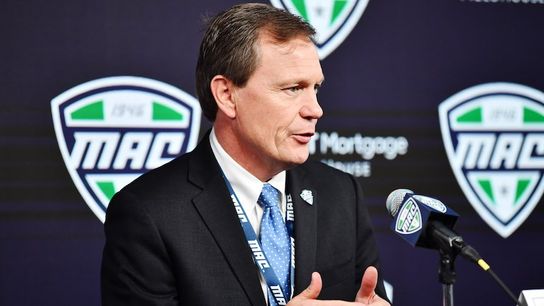As the Mid-American Conference readies for its 75th season of football, its commissioner, Jon Steinbrecher, opened the conference's media days Tuesday with a resounding takedown of the NCAA.
In opening remarks that spanned some 20 minutes and ranged on topics from changes in transfer rules to Name, Image and Likeness legislation as well as coaches and programs flaunting the rules, Steinbrecher said the NCAA must do better or be left to watch another entity take over collegiate athletics.
Sparing no element from criticism, Steinbrecher was perhaps most brutal in his blunt assessment of the NCAA's failures surrounding the just-passed NIL standards that opened July 1 and allowed student-athletes to begin to solicit and accept marketing deals for money and services.
“The era of student-athletes utilizing their Name, Image and Likeness to be compensated by third parties for things such as promotional activities and endorsements is upon us,” Steinbrecher said. “Two years ago at a council of directors of athletics meeting, prior to football media day, we spent several hours focused solely on this issue. We brought in legal and marketing executives and NCAA staff, so that we could explore what this may mean.
“Since that time we've had numerous discussions on this topic. It is unfortunate that we do not have a single national standard. It is a challenge to run national championships without national standards of conduct. Quite frankly, this is a failure by the entire association and reflects a lack of strategic direction and execution. The dye was cast on this issue two years ago when the State of California passed NIL legislation. At that time, the NCAA had two choices. One, pursue a legal strategy challenging California, and/or implementing its own NIL legislation. The first was not pursued; the second was not accomplished.
“As a result, we are left with little direction at this time. Hopefully Congress will act soon on this matter.”
Steinbrecher also urged the NCAA to consider legislative overhauls for programs with depleted rosters in wake of coaching transitions and other factors; he also promoted changes to the signing-cap limits and a reexamination of the Academic Progress Rates (APR) that can leave schools penalized with postseason bans and scholarship reductions.
“Considering the unified transfer rules, there are additional rules changes which must take place in short order. First, there needs to be a change in the Academic Progress Rate so that programs are not penalized if a student-athlete transfers,” Steinbrecher, who ripped the lack of evolution on transfer guidelines as basically unchanged since the 1960s prior to the recent one-time transfer rule, said. “Programs will unfairly lose retention points and possibly be penalized for decisions made by the student-athletes. The APR has been a tremendous tool in reinforcing the premise of a student-athletes academic achievement. But just as transfer rules have been modernized, the APR must be reformed to account for changes in student-athlete enrollment behaviors.
“Also attention must be given to adjusting the initial signing cap regulations. When a football program falls behind in its squad size, often due to a change in coaching staff or student-athletes moving on, it becomes almost impossible to catch up. There must be a way to permit a program the opportunity to rebuild its roster and do so in a way that does not encourage run-offs or over-signing or other negative behaviors that are behind the initial-cap rule.”
Atop the MAC since 2009, a move that followed six years as commissioner of the Ohio Valley Conference, Steinbrecher said the recent United States Supreme Court verdict – a unanimous decision against the NCAA in the Alston et. al vs. NCAA case regarding anti-trust laws – was a mandate to do better.
“The bigger message I took away from the decision and from the concurring decision was the need for the NCAA to get its act together,” he said. “For upwards of two decades, we have spoken of the need to modernize our rules. I look back at what were considered significant rule changes; allowing full-scholarship athletes to hold jobs; cost of attendance; a unified transfer rule. In each case, you would have thought the entire enterprise of intercollegiate athletes was about to collapse based on feedback from many of the practitioners. Quite frankly, that's nonsense.
“If we as an association of member institutions cannot figure out how to become nimbler, to change and adapt, without going through such extreme contortions, then the NCAA is as at risk. And that risk is that someone else will make those decisions for the enterprise of intercollegiate athletics.”
